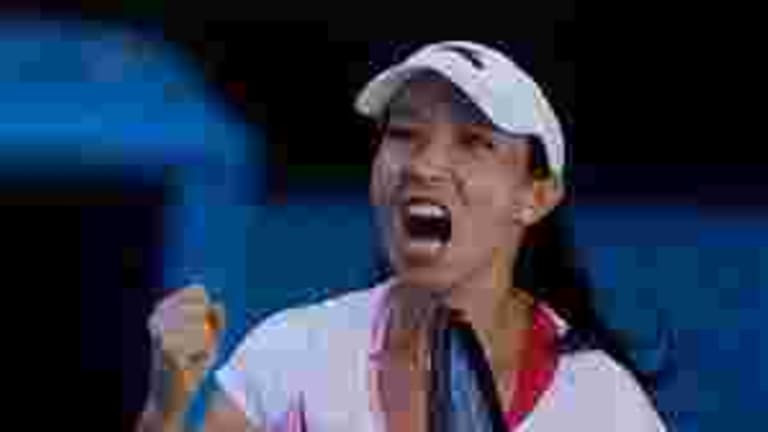‘Heaven save us,’ sighed the Australian commentator, presumably speaking for his nation, after Samantha Stosur murdered a volley long to give up a 54-minute first set to China’s Zheng Jie. He sounded resigned to another early exit for Stosur at her home Slam, and that was indeed what transpired, but only after a tortuous marathon of resurgences and reversals. It ended when Stosur, having served for the match twice, double-faulted to lose it, 6-4, 1-6, 7-5.
From the earliest stages of the match, when Stosur framed a serve that soared and bounced behind her diminutive opponent’s head, it was clear that she was battling herself as much as Zheng. Both players were dogged by unforced errors, but whereas many of Zheng’s could be excused by the fact that she was constantly having to stretch to the limits of her height, or take the ball unbelievably early to counter the kick of Stosur’s shots, the Aussie never found enough rhythm on her groundstrokes to allow her to relax.
And as Stosur knows only too well, Zheng is the last opponent a player struggling for confidence wants to face, having lost to her in a tight-fought match last week in Sydney. Even hampered by a right knee injury, Zheng’s court coverage and ability to take the ball on the rise are formidable, and she was relentlessly aggressive today, pushing Stosur back off the court and bullying her around behind the baseline, when one might have expected it to be the other way around.
The game Zheng played to break at love for 4-3 in the first set was both flawless and memorable. Her obvious weakness is the serve, especially her second delivery, and with a first-serve percentage of just 58, Stosur had ample opportunity to capitalize. Instead, she became visibly frustrated with her own inability to consistently attack that shot, while winning just 29 percent of points behind her own second serve.
It would take some sort of epic saga to chronicle the twists and turns of this encounter, but it’s worth noting that despite her ever-climbing unforced error numbers, Stosur looked for long stretches like she would grit and think her way to victory. After struggling to hold to open the second set, she changed tactics, responding to Zheng’s pummeling of her backhand by deploying slice and playing more patiently. Reading Zheng’s serve much better, she dominated the second set and—after an early exchange of breaks—gave herself the best possible chance of taking the decider, leading 5-2 with two chances to serve it out. Stosur led both games 30-15, and both times allowed Zheng back in with unforced errors. That was all the opening Zheng required, coming up with the kind of hammered forehand combinations that won her the first set.
Faced with serving to stay in the match after serving for it twice and struggling with the shadow on the court, Stosur’s down-the-line backhand failed her calamitously to go down 0-30. A terrible volley from Zheng gave Stosur a momentary reprieve, but she bounced back immediately, closing a long rally with a fantastic forehand winner. Stosur stared down the barrel of the gun and served her ninth double fault. It wasn’t her first early exit in Melbourne, but it had to be one of the most bitter.

